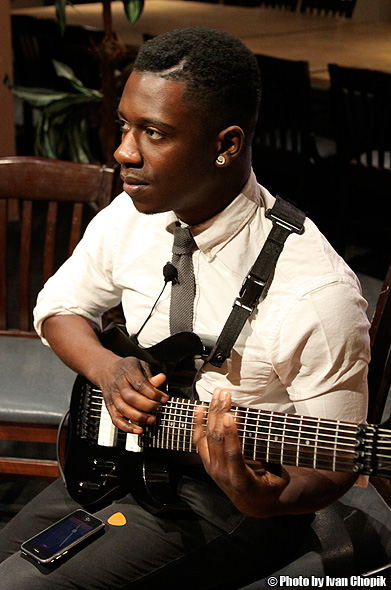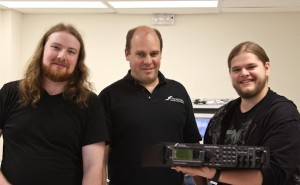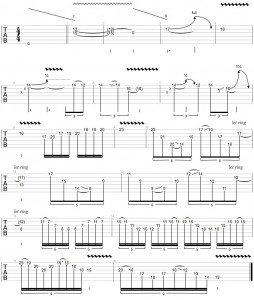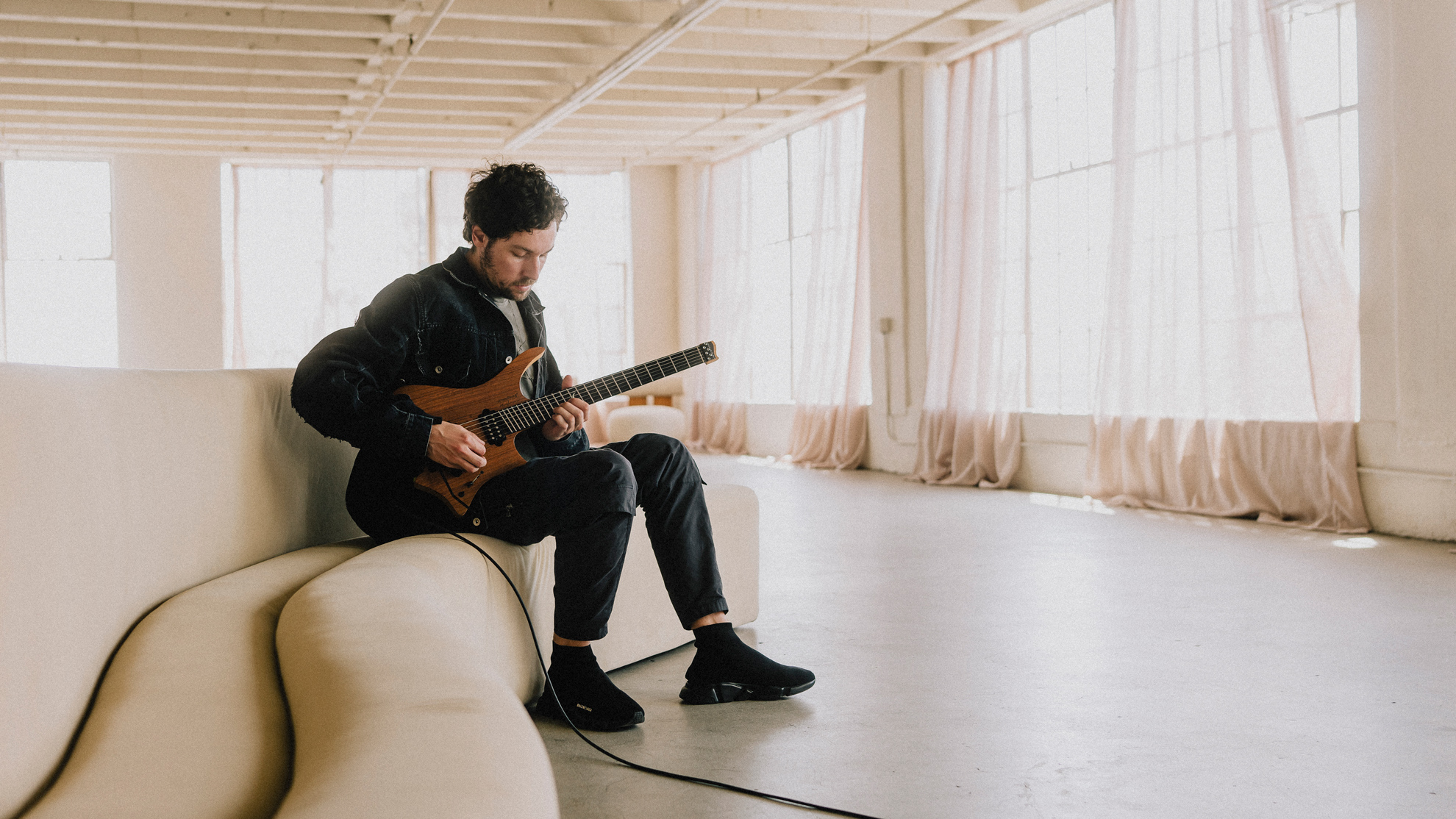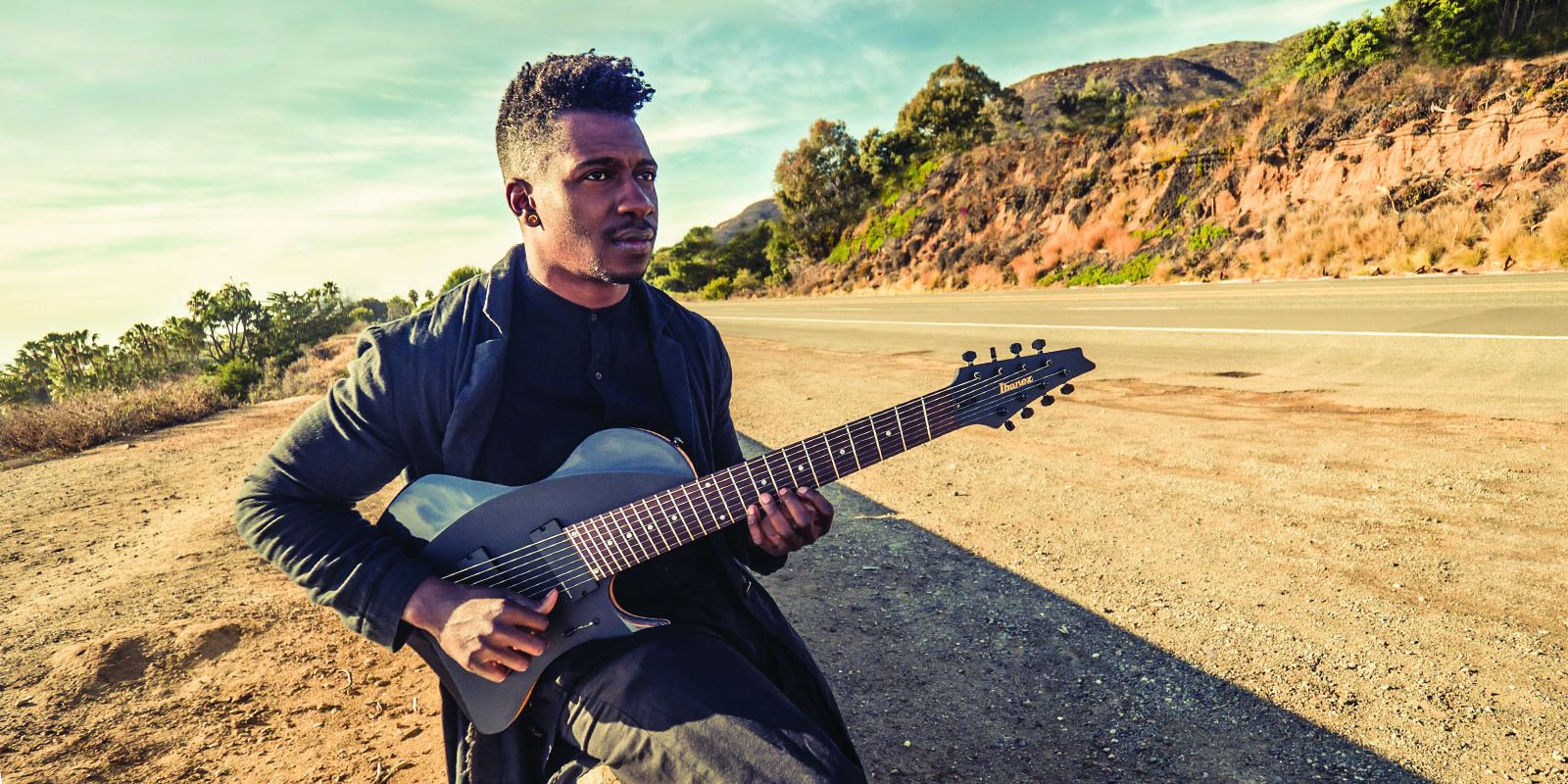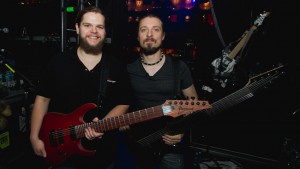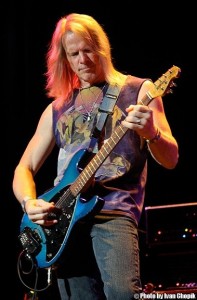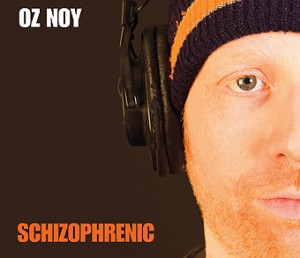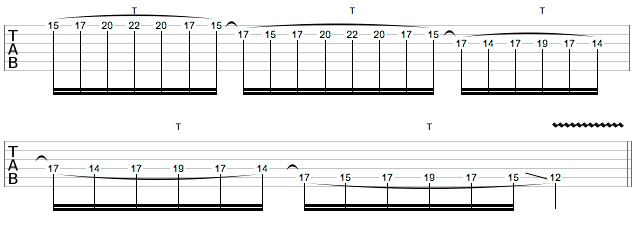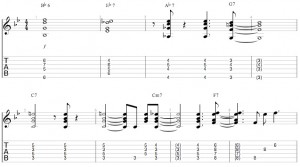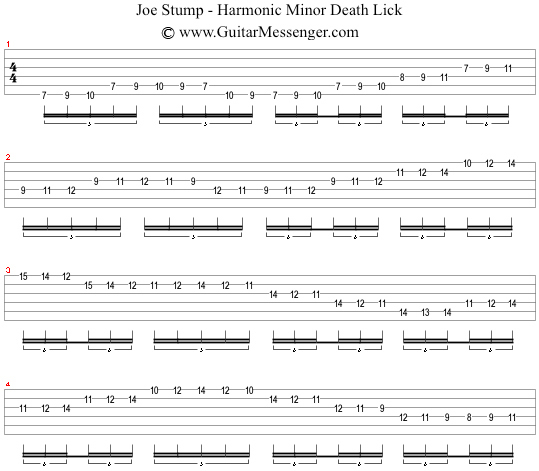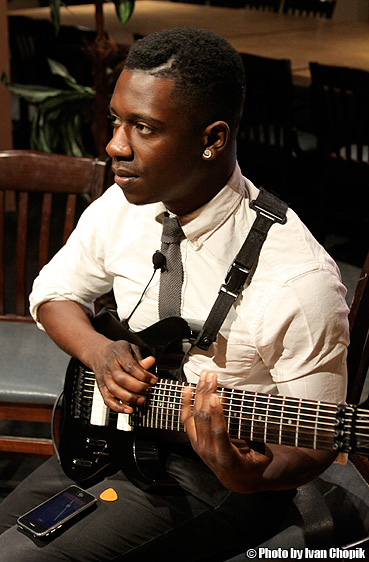 First emerging onto the metal scene with the Washington D.C.-based Reflux, extended-range guitarist Tosin Abasi quickly distinguished himself with his relentless riffage and captivating lead work. After Reflux disbanded, Tosin began work on a solo instrumental effort, the result of which was Animals As Leaders: a 12-track journey that leads listeners through an eclectic blend of progressive, guitar-driven music that fuses heavy, mesmerizing 8-string grooves and virtuosic lead work with tasteful electronic production and a range of stylistic influences.
First emerging onto the metal scene with the Washington D.C.-based Reflux, extended-range guitarist Tosin Abasi quickly distinguished himself with his relentless riffage and captivating lead work. After Reflux disbanded, Tosin began work on a solo instrumental effort, the result of which was Animals As Leaders: a 12-track journey that leads listeners through an eclectic blend of progressive, guitar-driven music that fuses heavy, mesmerizing 8-string grooves and virtuosic lead work with tasteful electronic production and a range of stylistic influences.
Guitar legend Steve Vai sums Abasi up with these thoughts: ‘When I first heard Animals As Leaders I felt as though I was at last hearing the future of creative, heavy virtuoso guitar playing. It’s quite amazing.’ Since the release of the debut record, Animals As Leaders has grown into a full band and completed a number of high profile tours to date – including Summer Slaughter 2010, where I had the chance to sit down and talk with Tosin:
IC: How’s the Summer Slaughter tour going?
TA: The tour is going great. It’s a pretty heavy tour, so we’re the oddball on the package, but all of the bands are super cool and they’re amazing bands, so it’s really fun.
IC: What else is going on in your world right now?
TA: Just thinking about the next album, and figuring out where we’re recording and what we’re going to be recording.
IC: Is there anything you can share with us about the direction of the album?
TA: We want it to be more organic, so we’re going to do live drum tracking – stuff like that, where it’s a bit less of the programmed-drums approach.
IC: It’s more of a band this time around, because you filled in members after the first album came out, right?
TA: Right. So we’ll be working on the material together.
IC: Tracking back, can you give me a little background on how you put together that first album?
TA: E.J. [Johangten] from Prosthetic Records had the idea of me doing a solo guitar CD, back when I was in another band called Reflux. I was kind of hesitant on the idea, but Reflux ended up disbanding, I went to school for music, and I guess I was a little bit more comfortable with composing music without vocals, and I had some ideas that I’d picked up in school that I wanted to get out onto a body of work. The only change I made was that I wanted it to be more of a band, as opposed to a guitar CD – even though it’s pretty guitar focused. I ended up hitting up Misha Mansoor of Periphery, or Bulb, as some people know him, and he was totally down to work on the album with me. So I went over to his house every day for two weeks, and we recorded the CD [laughs].
IC: Are you guys both from Bethesda?
TA: I’m not from Bethesda. I was born in D.C. and I moved to Gaithersburg, MD, which is a suburb outside of the city. Misha was living in Bethesda. At the time that I made the CD with him he was living in Van Ness, which is a part of D.C., and I was in Columbia Heights – we were only a few miles away from each other, so it worked out.
Are you still living there?
TA: No, I’ve been staying in North Hollywood. I’m kind of a vagabond [laughs].
IC: Recently, we saw the single ‘Wave Of Babies’ come out. What inspired you to put out a single on its own?
TA: That song was recorded at the same time that the album was done. It was intended to be on a compilation that never actually happened. So Misha and I did the album, and then a few weeks later, we got together to record that song, and then it just sat. Prosthetic had the idea of just releasing it as a single for people to have. It’s a cool song – I’m glad it’s out for people to hear.
IC: For only being three weeks apart, it’s got such a different sound. You guys must have made some adjustments.
TA: Yeah, Misha had a little bit more to do with that song. You’ll notice a lot more low-end riffing and grooving on that stuff. I think even his production improved slightly, just from the finishing of the album to recording that track. You can hear some differences in the actual sounds.
IC: It sounds like he changed his perspective on that in a very short period of time, because the Periphery stuff that ended up on the album also sounded very different [from the demos released not long before the album].
TA: Yeah, he’s ceaselessly working on better mixes, and he’s never really happy, so he’s always pushing himself to do better.
IC: How did the name Animals As Leaders come about?
TA: Choosing a band name is like naming your child – it’s really hard. You can’t decide on anything and it’s super permanent and it molds the way people perceive your band. I was at the point where I was just like: ‘I’m going to call it something.’ I was reading this book called My Ishmael, which is the second book in a series by Daniel Quinn – it’s an anthropological cultural critique, and there are some concepts in there about the way we live on the planet versus the way primitive humans used to inhabit the earth. The name is loosely connotative of a lot of the ideas that are floating around in my head, but it’s not meant to be anything you’re supposed to pay too much attention to.
IC: Tell me more about the writing process for the first album, and how it came together – how much you brought to it to begin with, and how it changed.
TA: I have a mental catalogue of all of these riffs, and some of them are five or six years old. So the writing process really boils down to tracking in all of the riffs that you have that you want to be in one song, and then you kind of glue it together with transitions or maybe eliminate parts or expand on parts. Working with Misha was really effortless – I didn’t have to explain anything to him, he would hear it and he would instantly conceive of a drum part.
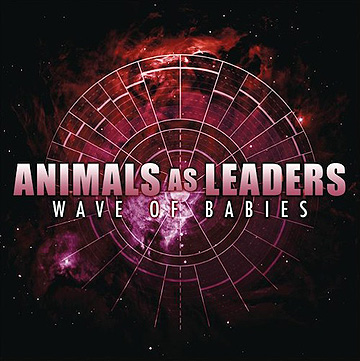
He really helped with the actual sequence of the songs, which I think really shines on the album – just getting everything together as a cohesive whole. The process is pretty straight ahead: I would track in the stuff to a click track and then all of the accents and everything present in the riff kind of illustrates what you would want to do rhythmically, and then we would layer stuff if we wanted to enhance certain parts of the melody or whatever the case is – just kind of start from the guitar and build up from there.
IC: You have such a unique blend of styles and influences in your sound. I want to track back to the beginning, to what originally inspired you to pick up the guitar – what you were listening to then, and then how different influences began to seep into your style into where you are now.
TA: The first music I ever bought was Green Day’s Dookie on cassette tape. So I got a guitar, and I just wanted to play alternative rock – Nirvana is a big favorite of mine. I was just playing power chords in every way possible. Then I think I heard some Hendrix and stuff. Blues was pretty graspable. It’s a pretty intuitive style of music, with the pentatonics and whatnot.
Then I remember hearing Yngwie Malmsteen and being unaware that you could even do that on the guitar, so then I got obsessed with technique and speed and the harmonic minor scale and various things like that [laughs]. That opened the door to all of these other shred guitarists, like Paul Gilbert, John Petrucci, Greg Howe and Frank Gambale.
IC: Sounds like you picked up some REH videos back in the day.
TA: REH was my jam, dude. I would consume like a video every few months. That’s how I learned to play, pretty much.
IC: Did you take any lessons when you were growing up?
TA: No, I was completely self-taught.
IC: Did you have a set practice routine that you worked on for a while, or were you doing bits and pieces here and playing a lot?
TA: Each of those videos has a wealth of information, usually stylistically relevant to the player that you’re watching. So whatever video I was watching, I would focus on the exercises in there. It’s all metronome-based alternate picking stuff. The Gambale stuff was more economy picking and sweeping and stuff like that. I would just be working on whatever video I was watching, and writing riffs.
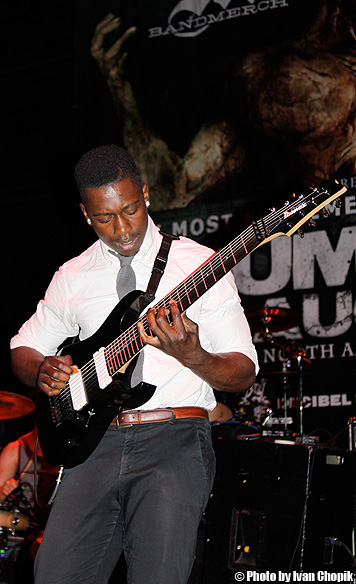
IC: These days, do you have a set practice regimen that you do?
TA: I have a few exercises that I’m using just to break out of certain barriers I have. I’m listening to more bebop, and I haven’t done a lot of improvisational playing – swing, and using passing tones and chromatics.
It’s a certain feel that I feel like I need to develop a bit further, so that’s where I’m focusing right now – turning on the click and perceiving the downbeat as an upbeat in sort of a swing and just improvising.
IC: Who are some of the people that you’re listening to right now?
TA: I’m listening to Adam Rogers a lot, and Jimmy Herring is a super, super cool player – as far as guitarists are concerned. I like Kurt Rosenwinkel a lot, too. Their approach to harmony is really stimulating, and I want to kind of develop that vibe in my playing a bit more. Jimmy Herring’s lines and his approach to improvisation is really awesome, too.
IC: He’s got such a great way of incorporating those outside sounds into his lines.
TA: His vibrato or his bends are enough to make you be like: ‘Jesus!’ That’s where I’m at right now.
IC: I think it’s really important for guitar players to see those roots, with the vibrato and blues-based playing, because a lot of times in metal, people tend to bypass that.
TA: Yeah, because they’re focused on what comes after that. It’s kind of a foundational approach to guitar playing that you can skip over pretty easily.
IC: What kind of stuff do you like to do outside of music?
TA: I read pretty avidly, and I’m kind of into food. I like eating good food, primarily raw if I can help it, but it doesn’t always happen. I like fashion, too, and I really like design that can inspire you.
IC: Do you see yourself doing any design work for Animals As Leaders?
TA: I wish I had a handle on Photoshop and various other graphics applications, because I have an idea of what the aesthetic would be. Right now I just try to find people who are already good at that, and understand what I’m trying to do. So I don’t know if I do see myself doing that, but there’s always time to learn.
IC: When you write, do you take down your ideas somehow? Do you demo things yourself?
TA: I started. I have a laptop rig that I record with. My production isn’t good enough, so when I record, the riffs kind of pale in comparison… The outcome isn’t as strong as I would like. If I work with someone else who’s better at production, I get a better result. Sometimes I’m hesitant to, but yeah, I demo stuff pretty randomly – I just track stuff in.
IC: Let’s talk some gear. You’re an avid supporter of the Axe-Fx. How did you get in touch with Fractal and end up trying it out?
TA: Misha brought it up to me, just because he’s all over the gear stuff. I was like: ‘Alright, if you think it’s cool. I’m pretty sure I can trust your opinion.’ I played his, and its amazingly lifelike. Listening to a recorded tone is one thing, but playing an amp has a very specific response – specifically tube amps. The Axe-Fx does the most accurate job of feeling like a real amp that I’ve ever encountered – the harmonic content, everything about it feels right.
I had this extravagant rig, and I was just like: ‘Man, this isn’t really practical.’ I was aware that I could do everything I was doing with a 2-space rack. Then the whole full-range approach, your reverbs and your delays… You can create these very dream-like, un-guitar-sounding textures as well, which I’m into. Beyond that, running direct gives you a very present, cutting presence in the mix. It’s pretty dramatically different than micing up an amp. All of these factors started to add up, so I took the plunge.
IC: Can you talk a bit about your clean tone?
TA: It’s pretty straight-ahead. I like a pretty bright clean tone – chimey, you know? So I’ll run a Vox AC30 simulation, or one of the Fender Blackfaces or something, just a very classic approach to clean guitar.
IC: What about your distortion sounds?
TA: I’m into blending tones, so for my clean I blend two amps, and then for the distortion I blend two, as well. I’ve been using the Diezel VH4 [Das Metall] setting, which is very mid-rangey, but still has that modern rapid bass response, that tight, focused low-end. I’ll blend that with a more organic amp, like the Fractal model called Crunch. It’s like a very driven tube preamp, so I’ll just crank the mids on that and create a balance between the two. It sounds pretty good.
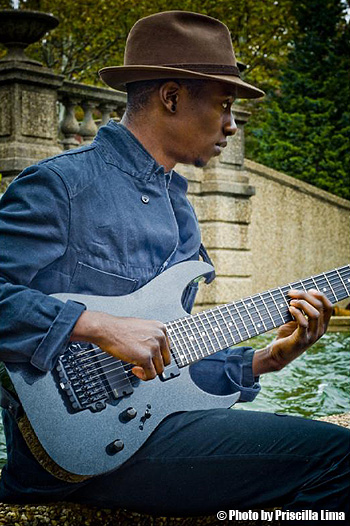
IC: When you do a lot of your tapping stuff, is there anything that you change about your tone to bring out the notes more?
TA: Yeah, mids and presence help, because then you can actually hear the attack a little bit more – presence versus treble. Compression is your friend, for sure, so you can get an even output of all the notes you’re tapping. It’s cool to tap with semi-distorted tones – just get a little of that drive, but nothing too saturated.
IC: When you play live, is the Axe-Fx your entire rig?
TA: I have a Boomerang, which is a phrase sampler, but honestly, the Axe-Fx has a built-in phrase sampler. I use the Boomerang just because the buttons are very quick, as opposed to the normal stomp box buttons. I’ve just been using it for a long time, and it’s almost like an instrument to me – I’m familiar. I’ve been doing things where I use the internal phrase sampler in the Axe-Fx and the Boomerang to do multiple lines of loops.
IC: You guys are only a trio when you perform live. Are you triggering other things, or do you play to a click to get all of those electronic sounds?
TA: We play to a backing track. It doesn’t have any guitar tracks on it – it’s just bass, synths and electronic drums. Javier [Reyes, guitar] plays all of the rhythm parts, and I’ll phrase sample myself and kind of loop that stuff, and maybe play rhythm with him or continue on a lead line. There are a lot of layers on the album, so I have to do a bit of looping.
IC: You’re not using any actual cabinets when you perform live – you go straight into the PA, right?
TA: Right. I’ve been running a Mackie HD1521 monitor – it’s a 2-way speaker system, just for my own reference on stage. But honestly, most of these venues have sidefills, and if you put yourself heavy in the monitor mix, you’re there. It feels like you have an amp.
IC: Animals As Leaders really stands out in a tour like Summer Slaughter, as you mentioned before. What’s some of the feedback that you get from that audience?
TA: We’ve been received really well. I think the contrast is working for us, just because if you’re a death metal fan and you randomly hear us on Summer Slaughter, I’m pretty sure it’s a surprise [laughs]. I think there are a lot of things that we include in our music that don’t happen too readily in extreme metal, like the use of extensions in our chords, and this emphasis on polyrhythms based on a quarter note, moderate tempo. So stylistically, we’re just not death metal, so people are kind of blindsided – but it’s pretty melodic, and texturally there’s some interesting things going on, and I think people are digging it. It’s definitely been pretty positive responses [that we’ve gotten].
IC: On the business side of things, this first album came out on Prosthetic Records, and you were approached by Prosthetic Records before about doing a solo album. What are your thoughts in general about releasing music down the road, with the changes that are at hand?
TA: The music industry is seriously in flux. There’s a bit of hysteria, because the old ways of monetizing music are kind of vanishing. Information is free, media is not physical anymore, and there’s generations of kids born into a situation where Tower Records doesn’t exist. You don’t go and physically buy music – you download music. I think there’s going to be this forced evolution into monetizing that stuff, as opposed to exclusively selling a physical CD. You’re going to have to figure out ways of making money from the fact that people are taking what they want, more or less.
The label’s role is definitely changing. I don’t really like to think about that part of it. If I could exist in a vacuum, that’d be nice – and just make music and have people hear it. But that’s unrealistic. I think any musician who’s on the cusp of releasing music, and analyzing the conventional ways of doing it, and then looking at this new animal that is the Internet… It’s a new frontier. A lot of electronic musicians are just giving away full LPs and stuff. So it’s very weird, and I think we kind of have to embrace that whole [approach]…
IC: So maybe it’s not finding ways to monetize with the present model, but finding different sources of revenue – accepting that people are going to be able to take your music. Maybe that’s the approach.
TA: It is, and analyzing what is more beneficial. Because I know that word-of-mouth, and the fact that our CD pretty much leaked a year before Prosthetic released it was kind of to our benefit.
It doesn’t benefit the label if their primary source of revenue is selling a CD, but as far as the band getting bigger, it’s this weird sort of groundwork that you can do. Without any money changing hands, people are hearing your music and you’re getting bigger – which down the road does reflect into money, like people at your shows and stuff like that.
IC: One of the ways that labels are trying to compensate for the loss of record sales is through 360 deals. Do you have a similar arrangement with Prosthetic, or are you handling your own merch and so forth?
TA: Our contract with Prosthetic definitely represents the traditional business model. 360 deals are definitely a response that labels are taking. I haven’t been part of that situation – I don’t know if it’s a positive or negative thing. I guess it makes sense – they’re forced to essentially tax you in other ways.
IC: This is an open-ended question, and a hard one: can you think of any other possible ways that you could monetize your music?
TA: I think it’s the arena for a marketing specialist as opposed to someone like me, but… This would have to be paralleled by technology following suit, but if the quality of your music was a reason for people to buy it, like the sample rate [could be] higher or the amount of content you get was something you couldn’t download as easily. Everyone is listening to MP3s on a player, and the quality is really truncated. That could be a reason to actually pay for something versus stealing it – you get a much better product. There are various ways. I think it’s just at the point where music is essentially free. It’s kinda weird [laughs]. It’s like a moral thing – very few people have a moral obligation against taking music.
IC: I see a lot of the younger kids, who don’t have the physical attachment of holding the CD and having it. For me, I like having the actual CD – I look at the artwork and everything. But for someone who hasn’t even experienced that at any point, there’s no attachment.
TA: Totally. So how do you ingrain that? They don’t even have that experience.
IC: I guess time will tell.
TA: Yeah, it’s interesting – I want to see how it pans out.
IC: Where do you see yourself and the band in five to ten years?
TA: I’m trying to do some epic, Pink Floyd-status… If you come to a show, I want it to be a big sensory experience.
IC: So you want to get the visual aspect of it down, too.
TA: Yeah, because by not having a vocalist, and the scope of the music is pretty adventurous… We’re not too concerned with having you look at the three of us onstage. We’d like the experience to be a bit more inclusive of other senses – some visual stuff like that, just so that if you come to see us play, you feel like you were on a different planet for a moment.
IC: Do you ever anticipate yourself doing any work with a singer?
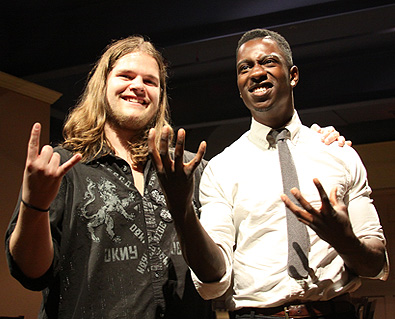
Tosin Abasi and Ivan Chopik
TA: Yeah. There’s a female vocalist named Kelela Mizanekristos that I have written some songs with, and I hope to do a full album with her at some point. Right now, Animals As Leaders is still trying to reach more people, and we still have more groundwork to do. But I definitely plan on doing some vocal-centric music, as well as instrumental music.
IC: Have you been collaborating with anyone else?
TA: The drummer of Circa Survive, Steve Clifford – he and I have been going back and forth with files of demos that we’re doing. He’s singing on it and doing some production, as well. We hope to put out an album at some point, too.
IC: What’s your advice to young musicians coming up right now who are looking to make their mark and get themselves out there?
TA: The thing that’s benefited me the most is cultivating originality or individuality in my playing, because there’s a wealth of amazing guitar players and amazing musicians in general all over the world. You can go on YouTube and see a 13-year old kid shred your face off. So at what point does it cease to matter? What’s your contribution to music beyond your technical achievement?
Everyone’s an individual, and they have a unique voice – I could never sound like you, and only if you chose to emulate me would you sound like me. My advice would be to examine your own playing and your own feelings about music, and focus on what you would like to contribute to the wealth of music as an individual. Because you are yourself – no one else is you. You can own that for sure.



